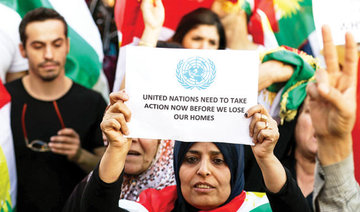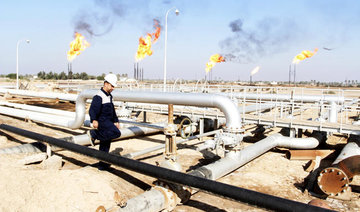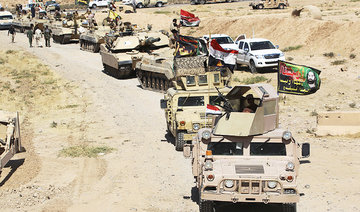BAGHDAD: The Kurdistan Regional Government (KRG) on Monday issued arrest warrants for 11 Iraqis, including federal lawmakers and senior commanders of Shiite-dominated paramilitary forces, for “insulting the public authority,” Kurdish officials said.
Qais Khazali, commander of Asa’ib Ahl Al-Haq, one of the most prominent Iraqi Shiite paramilitary forces fighting Daesh, is among those named in the warrants.
“The arrest warrants have no political or legal force,” Naiem Al-Abodi, spokesman for Asa’ib Ahl Al-Haq, told Arab News. They reflect KRG President Masoud Barzani’s “hysteria after the great losses he suffered.”
In response to the KRG’s independence referendum last month, Baghdad last week launched a military campaign to drive Kurdish forces out of the northern city of Kirkuk, its lucrative oil fields and all disputed areas next to Iraqi Kurdistan’s borders.
The KRG has taken advantage of the weakness of Iraqi federal governments formed since 2003 in order to gradually extend the region's borders and to seize most of the disputed areas including Kirkuk and its oil fields.
Baghdad’s military campaign has achieved almost all its objectives, and troops have stopped at Iraqi Kurdistan’s borders.
The Security Council of Kurdistan on Monday said Baghdad has sent reinforcements, including tanks and armored vehicles, to the region. “No signs suggest that Iraq will end the military operation,” the council said in a statement.
A senior military officer involved in the operation told Arab News on condition of anonymity: “We’ve said we have no intention of going into the (Kurdish) region. Our orders direct us to regain control of all disputed areas, secure them in order to let people resume their normal lives, and help those who were displaced by the KRG to return home.”
He added: “We haven’t sent additional troops, but we’ve increased the number of troops in western Mosul in order to secure the oil pipelines in the area.”
Federal officials have told Arab News that the aim is to reach the Turkish border in order to open a new crossing.
To achieve this, Baghdad has to gain control of the Habur border crossing, which is 7 km inside the border of Iraqi Kurdistan, they said.
“We won’t cross the region’s border, but the authority of the federal government has to be imposed on the crossing,” a senior Iraqi official told Arab News on condition of anonymity.
In addition to the military campaign, Baghdad has banned international flights to and from Iraqi Kurdistan, stopped financial transactions with the region, rehabilitated oil pipelines between Kirkuk and Ceyhan port in Turkey in order to bypass Kurdistan, and established a joint operations room with Turkey and Iran.
Iraqi Prime Minister Haider Al-Abadi, will visit Turkey on Wednesday to discuss the two countries’ “joint interests,” his office said.
Iran shut down its three official border crossings with Iraqi Kurdistan last week. Ankara is working with Baghdad to open a new crossing outside Iraqi Kurdistan in preparation for shutting Turkey’s crossings with the region.
KRG Prime Minister Nichervan Barzani said the regional government is ready to start “serious talks” with Baghdad based on Iraq’s constitution.
“We’re waiting for Baghdad’s response… It’s not clear when a delegation from the region will visit Baghdad,” he said on Monday.
On Saturday, the federal Integrity Commission issued an arrest warrant for Baker Zebari, former chief of staff of the Iraqi Army and a prominent Kurdish leader, on charges of “damage to public funds.”
Last week, Zebari appeared on Kurdish television wearing a Kurdish military uniform, standing among Kurdish troops and threatening to fight federal forces.
“He’s considered an outlaw, and he’ll be arrested and held accountable as soon as possible,” Iskander Witoot, deputy of the security and defense parliamentary committee, said on Sunday. Witoot is among those named in the KRG arrest warrants.
Late last week, an arrest warrant was issued by a federal court against KRG Vice President Kusrat Rasool on charges of “insulting” federal security forces.
Two weeks earlier, an arrest warrant was issued by a federal court against the head of the Regional Electoral Commission in Iraqi Kurdistan, as well as two commissioners, due to their involvement in “setting the referendum.”
Jamal Al-Assadi, former inspector of the federal Justice Ministry, told Arab News: “The arrest warrants issued by the KRG aren’t valid outside the region, and there will be no legal consequences in Baghdad or abroad.”
He added: “Unfortunately, the judiciary in the region has been involved in politics, and the KRG has been using it as a political tool.”
























